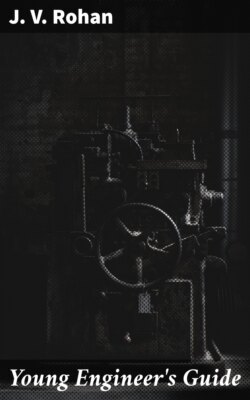Читать книгу Young Engineer's Guide - J. V. Rohan - Страница 4
На сайте Литреса книга снята с продажи.
ОглавлениеYoung Engineer’s Guide.
HINTS TO PURCHASERS.
Table of Contents
In selecting an engine of whatever style, or for whatever purpose it is very important to get not only a good one, but one that is of the proper size. Do not entertain the mistaken idea that it is best to have a larger engine than is required (so that it will do its work easily), as an engine which is too large for the work required is very wasteful both of fuel and water. An engine always gives the best results when it has a fair load.
In the selection of a farm or traction engine you should look carefully to the arrangement of the driving gear, the manner in which the engine and the traction wheels are attached to the boiler, the convenient arrangement of the throttle lever, reverse lever, steering wheel, friction clutch lever, independent pump (if used) and injector for easy operation from the footboard, as the easy control of all these parts by the engineer saves much time and annoyance and in many instances may prevent accident which might prove disastrous to both life and property.
Always purchase a boiler with sufficient capacity to allow a small margin beyond its ordinary requirements. Be sure and have the boiler or boilers properly set so that the best results may be derived from the fuel burned. Many good boilers are condemned because they do not steam well on account of bad setting.
If a locomotive style of boiler, see that it has a large fire box (well stayed) and a sufficient number of flues to allow of easy firing and good combustion of the fuel without being obliged to use a forced draft.
If a return flue boiler see that the main flue is of sufficient size and of the required ⁵/₁₆ inch thickness of material; also that it has a mud drum and from four to six hand-holes (the more the better) both top and bottom for the purpose of keeping the boiler free from scale and becoming mud burnt and unsafe.
Remember there is no advantage in carrying low steam pressure in boilers as it is more economical to carry high pressure rather than low. The average boiler pressure should be about 80 lbs. per square inch, which is not too high for safety, nor too low for economy of fuel.
The purchaser must use his own discretion as to the style of engine he prefers, a horizontal or vertical, side or center crank, as all styles are extensively used with equally good results. It is purely a matter of preference depending, of course, largely upon space or room available for stationary engine.
Do not make the mistake of deeming that any kind of a foundation will answer for a stationary engine. It should be built by a skillful mason in every case and hard brick or stone and cement used in its construction. The best is always the cheapest in the end.
An engine or boiler should never be put in a dark corner or damp cellar, rather place them when possible in dry well lighted rooms and so arranged that every part can be reached when necessary without trouble or delay. Walls and floors should be kept clean and a good supply of oil cans, wrenches, waste and whatever tools are needed should be kept in their proper places.
The purchaser of a traction engine should see that it has a Friction Clutch as an engine with a clutch is much more practical, convenient and safe to handle upon the road than one without a clutch. The matter of brackets, braces, gearing, traction wheels, axle, the manner in which the engine is mounted upon the boiler should be well considered as there are many kinds and styles, all of which have their merit “more or less.” Your own judgment should be used as to the style wanted after thoroughly studying the various kinds.
Do not make the too common mistake of thinking a cheap engineer is the man you want. The engine and boiler are important factors in the success of your business and no matter how simple and strong they may be it will pay you to put them in charge of a competent engineer who is capable of taking the proper care of them. For a small plant, or traction engine, it is not necessary to have the highest grade of ability, as there are several grades among engineers; but it is better to pay a suitable man for competent and faithful work than to pay for what may happen through the neglect or incompetency of one whose only recommendation is that he is cheap.
Do not be deceived by imposters claiming to be first-class engineers, who, the first thing they do, to substantiate their claims, alter the engine in some way that only deranges it. Be watchful of this and see that such men do not tamper with the valves and adjustments of the engine, which are always set properly before it leaves the factory.
